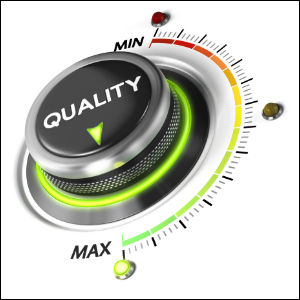 Businesses are always looking to introduce new, innovative products and services their customers will love that will ultimately increase their bottom line. However, does this require data? Does it require high quality data? (See article How much does data quality really matter?)
Businesses are always looking to introduce new, innovative products and services their customers will love that will ultimately increase their bottom line. However, does this require data? Does it require high quality data? (See article How much does data quality really matter?)
There are numerous debates surrounding the importance of data and it is something that continues to baffle many business professionals. Since the term “big data” was adopted by the evolving digital world, the term has become overused. It is now a “buzz word” that swamps the internet. As such, its meaning appears to have been lost amongst the morass causing information overload. Because of this, many business professionals have become blinded with too much information and are now confused as to what they should be doing with their data, what data they must collect, which data is most valuable, and how to maintain or even manage it.
This confusion has caused many to question the importance of data in general, including the quality of the data they have and continue to collect. What’s more, quality is important, but as is whether or not you have the right data. One of the most important elements in any data collection, analysis, and reporting activities is identifying how the data you have will be used.
In a survey conducted by Experian, 42% of respondents said data quality was draining bank accounts and causing marketing problems.
So, what’s the problem? Why do businesses struggle with quality? It appears to be that many struggle to understand what constitutes as quality.
What Does Quality Data Look Like?
Data quality is an incredibly ambiguous and unknown term of value, since without knowing what data is required to achieve one’s goals, the quality is irrelevant. As such, there are different measures of quality, including the completeness, the age of your data, the source where the data was obtained, and the measurement of value that data brings—each of these help to determine the value of your data.
Here are some questions you should ask yourself to determine the quality and therefore the value of your data:
- Does your business data meet the basic needs for which it’s collected?
- Does your data enable you to discover actionable insights in order to improve your product and service offering in relation to market trends?
- Is your data complete?
- Is your data regularly updated?
If you answered no to any of the above questions, you could be losing money and harming your business’ reputation.
The Effects of Not Focusing on Quality
If you don’t know what you’re trying to achieve, time will be spent on tasks and/or activities that do not achieve results. This results in wasted man hours, missed targets, and a disengaged workforce, since no one will be able to achieve results, along with duplicate data—all of which can result in bad customer service, inaccurate reporting, and missed opportunities. For example …
- If you have out of date or duplicate records, how can you ensure budgets are being spent wisely?
- If there are duplicate customer records, how can you understand their purchasing patterns?
- How can you make informed decisions if your business data is inaccurate?
Poor data cannot be used as a foundation for anything, since every output is going to be hindered by doubt. By not focusing on data quality you’ll find that every department within your business will be inconvenienced. You’ll be unable to measure the efforts from marketing activities and when it comes to pulling together a report, you won’t be able to trust it, which will ultimately result in a poor ROI. As we explained in our article here, quality is essential for any modern business.
The effects of not focusing on quality will result in the inability to compete with other more agile businesses in your industry.
The Importance of Quality
(See article Data is your most valuable asset) What’s more, it’s been said that those with usable data will experience a 10% increase in overall company productivity and they’ll grow 35% faster year on year. Further, following extensive research, Eloqua found that companies that practice consistent data hygiene and work towards improving the quality of their data achieve seven times more inquiries and four times more leads.
It is vital to understand the problems and challenges your business may face in order to pinpoint what data is required to enhance your business’ performance. Identifying the right data will allow you to obtain critical business intelligence, helping you to improve employee engagement, create targeted business strategies, improve customer retention, acquisition, satisfaction and overall ROI.
